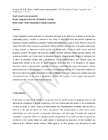Small corpora and pragmatics (Pre-published version)
Citation
Vaughan, E. & B. Clancy. ‘Small corpora and pragmatics,’ The Yearbook of Corpus Linguistics and Pragmatics, 1: 53-73.

View/
Date
2013Author
Clancy, Brian
Vaughan, Elaine Claire
Peer Reviewed
YesMetadata
Show full item record
Vaughan, E. & B. Clancy. ‘Small corpora and pragmatics,’ The Yearbook of Corpus Linguistics and Pragmatics, 1: 53-73.
Abstract
Corpus linguistics is more often than not associated with large-scale collections of spoken or written data, representing genres, varieties or contexts of use. Many of these have been successfully exploited for pragmatics research, producing generalised findings that hold across a range of texts. However, it may be argued that rather than stopping at generalised findings that note the frequency of pragmatic phenomena in large corpora, an important research agenda now foregrounds a focus on small corpora and local pragmatic patterns. This paper will argue that smaller, carefully collected, context-specific corpora, both spoken and written, are of great import in pragmatics research. Many pragmatic features of language such as deixis or pragmatic markers play a fundamental role in communication, and, in these cases, are linguistically realised in the type of ‘small’ linguistic items that tend to be frequent in all corpora. Therefore, smaller corpora provide a platform for not only establishing the range and frequency of these items but the role of different genres or contexts in characterising their use. We will provide evidence for this in the form of two corpus case studies in order to illustrate how small corpora have created a practical and empirical route for the study of pragmatics, and how this synergy of small corpora and pragmatic research provides rich and contextualised findings.
Keywords
Large corpusPersonal pronoun
Small corpus
British national corpus
Family discourse

